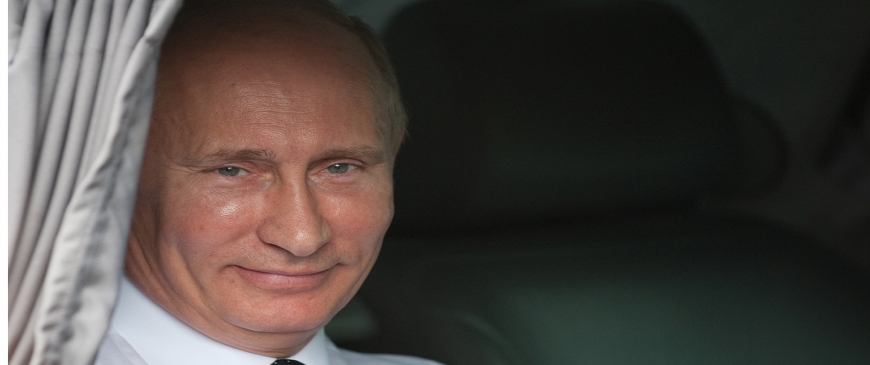
Plenty of crime but no punishment for Putin
Rodion Raskolnikov, the protagonist of Dostoevsky's "Crime and Punishment," murders an old woman and her sister, believing that an extraordinary man has the right to commit any crime in order to benefit mankind. His mistake is to think that because extraordinary people commit crimes, he will become extraordinary by committing a crime.
It seems that President Vladimir Putin would like to go down in history as an extraordinary man, who restored Russia to greatness. Unfortunately, his intervention in Ukraine risks making him the Raskolnikov of international relations.
Even the Soviet Union did not annex the territory of other states after 1945, but in seizing Crimea, Putin has violated this taboo.
By sending troops without insignia to fight an undeclared war in eastern Ukraine, and supplying weapons to separatist groups who have committed brutal acts against both Ukrainian soldiers and civilians, he has violated international law.
As the casualties mount up among the Russian forces and pro-Russian separatists now fighting in eastern Ukraine — as well as among Ukrainian troops and civilians — Russia's economic prospects are worsening and its international reputation is at a very low ebb.
The Ukrainian adventure is not making Russia a great power again. It is taking it back to its dismal Soviet past of poverty, repression and isolation.
The war can be ended if Putin wants to end it. A civilian injured by fighting near Luhansk begged him in a televised interview to call back his forces to Russia. The weapons funneled into Ukraine over the last six months should go with them.
If Putin wants to offer asylum to ethnic Russian separatists in eastern Ukraine, that would be a price worth paying to stop them destabilizing the east again, even if it puts them out of reach of Ukrainian justice for the time being.
Without Russian advice, equipment and personnel to support the separatists, over time the region could revert to what it has been since Ukrainian independence — basically peaceful and content to be part of an independent Ukraine, albeit poorly governed, corrupt and in need of investment.
It could be much better than that if the next Ukrainian government tackles economic and political reform with determination.
Russia's European partners should stop pretending to believe Putin's assertions that Russia is a disinterested bystander, and tell him that the conflict cannot be solved until he admits that Russia is a party to it.
Unfortunately, lengthy talks in Minsk on Aug. 26 involving the EU, Ukraine and Russia showed that Putin is still trying to deny responsibility for the mess.
When Putin claims that the fighting is an internal matter for "Ukraine, Donetsk and Luhansk," and not Russia's business, as he told journalists in Minsk, and when his spokesman denies that there is a cease-fire agreement between Russia and Ukraine because Russia is not a party to the fighting, the EU should be blunt: When Russian troops and Russian weapons are being used on the territory of Ukraine, that is Russia's business and there will be consequences.
So what will these consequences be? No one, except the Ukrainians themselves, is willing to fight Russia on the battlefield. But the West can do more to encourage Putin to look for an exit.
Ukraine has an inherent right to self-defense. Without putting "boots on the ground," NATO countries could provide military equipment, intelligence and training to help Kiev fight the separatist threat more effectively.
EU countries can step up economic and technical assistance, including in the east, to improve Ukraine's chances of becoming a prosperous democracy.
The West can also increase the economic pressure on Putin. So far it looks as though Russia's own counter-sanctions on EU agricultural products will do more damage to the Russian economy as a whole than any sanctions the EU itself has imposed.
But there is much more Europe can do to tighten the screws on individuals and companies close to Putin, starting with more rigorous implementation of existing EU regulations on money-laundering.
Even if Putin eventually calculates that the costs of pressing on in Ukraine outweigh the benefits, he is unlikely to surrender unconditionally. Ukraine and its Western partners will have to find things to offer in return for Russia ending its destabilization of the east.
One step would be to establish a long-term OSCE mission in Ukraine to monitor human rights and run programs to strengthen the rule of law, thereby dealing with Russia's ostensible concerns about ethnic Russians in the east.
Another step, following on from the EU's meeting with the members of the Russian-led Customs Union in Minsk, would be to formalize some sort of modus vivendi between the EU and the Eurasian Economic Union.
This would deal with Russia's worries about EU free-trade agreements with Russia's neighbors.
A third, reflecting the bitter reality that Ukraine is unlikely to recover Crimea by force, would be Ukrainian acceptance that it would only pursue the return of the peninsula by peaceful political, legal and economic means.
Such offers cannot even be on the table, however, as long as Putin is intent on achieving greatness by overthrowing the established order, regardless of the human cost. Dostoevsky created an extraordinary woman, Sofya Marmeladova, who gets Raskolnikov to see the error of his ways and confess his crime.
Without wishing to push the comparison too far, the European leader who has spoken more to Putin than anyone else — more than 30 times since January — is German Chancellor Angela Merkel.
She should tell him that Europe and Russia suffered enough at the hands of extraordinary men in the 20th century; Putin should stop trying to be the next one.
Ian Bond is director of foreign policy at the Centre for European Reform.
